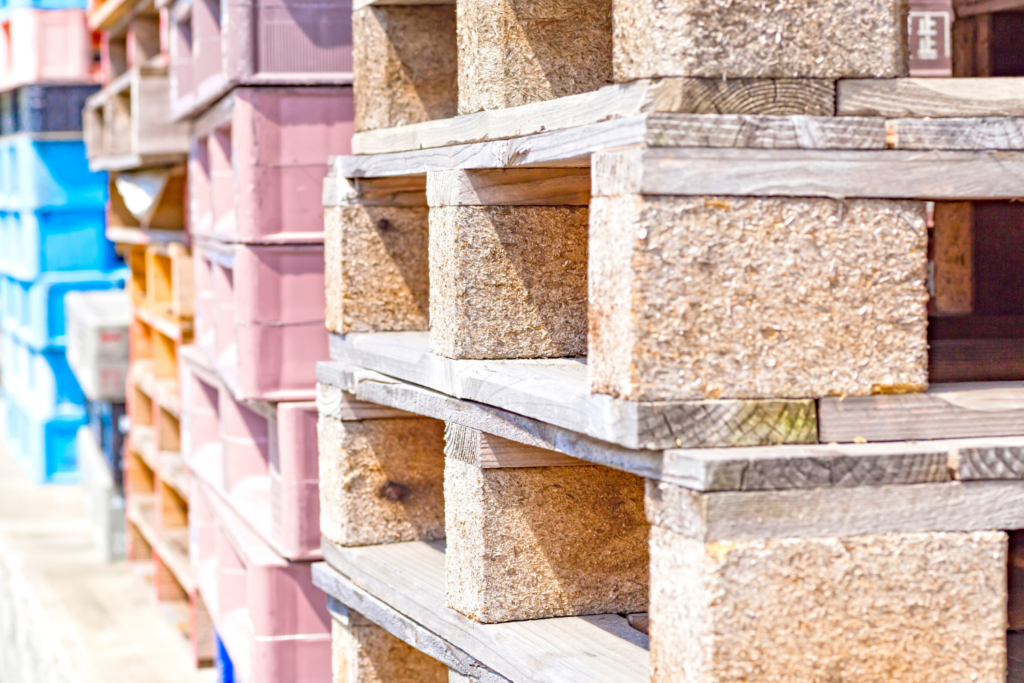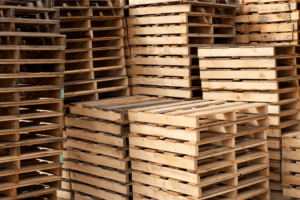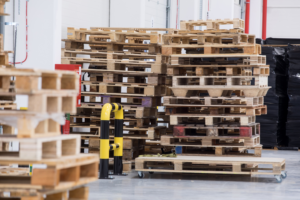Both plastic and wooden pallets have their place in various industries.
The key is understanding the unique benefits and limitations of each to make informed decisions that not only meet immediate logistical needs but also contribute to long-term cost management.
If you strategically select the right pallet type, you can optimize your operations and ensure a responsible approach to materials used in the supply chain.
Let us discuss plastic vs. wooden pallets.
What Are Plastic Pallets?
Plastic pallets are made from materials such as high-density polyethylene (HDPE) or polypropylene.
They provide a durable and lightweight solution for transporting goods, offering resistance to moisture, chemicals, and insects, which makes them suitable for industries requiring high hygiene standards.
Their design can vary, including solid deck or open deck options, and they are often engineered to be stackable or nestable for efficient storage.
Although they can be more expensive upfront compared to wooden pallets, their long lifespan and reusability can offset initial costs.
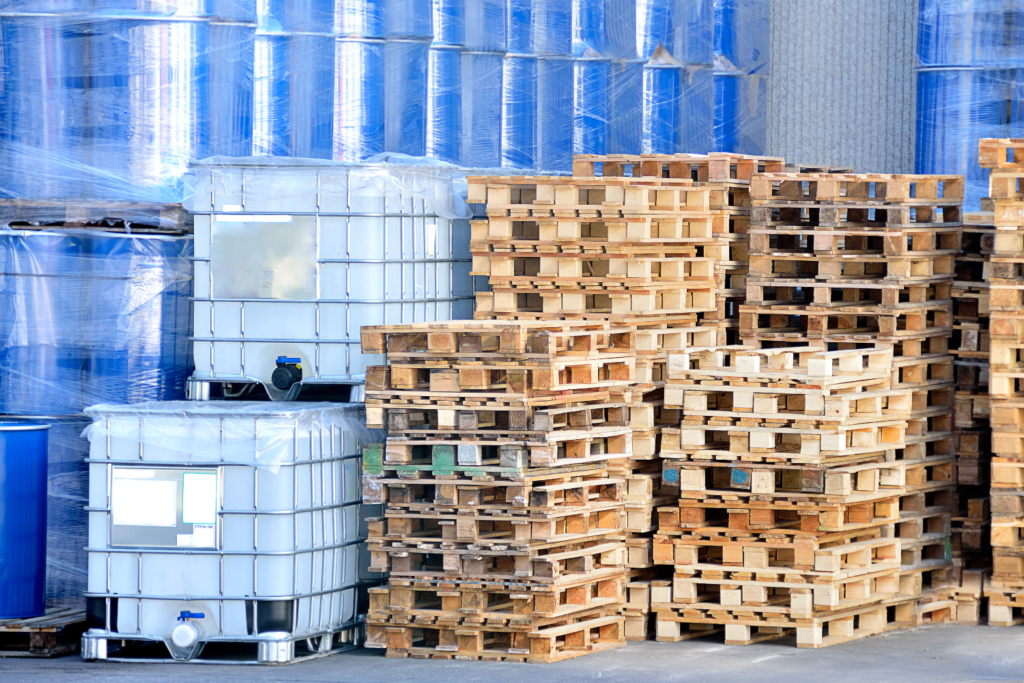
What Are Wooden Pallets?
Wooden pallets are made primarily from hardwood or softwood materials such as oak, pine, or poplar.
They are widely used for shipping and storing goods due to their affordability, strength, and ease of repair.
They have a natural friction that helps stabilize loads and can be easily customized to fit various sizes and weight requirements, making them suitable for diverse industries.
While they can absorb moisture and may attract pests, treatment processes like heat treatment or fumigation can address these issues to comply with international shipping standards.
They are more prone to damage than plastic pallets, but they can be repaired and reused multiple times, contributing to a circular economy when refurbished.
At the end of their life cycle, they can also be recycled into mulch, wood chips, or even used in energy production.
Plastic vs. Wooden Pallets: Which Is More Environmentally Friendly?
Both plastic and wooden pallets offer environmental benefits, but they do so in different ways.
Plastic pallets emphasize recyclability and the potential to be made from recycled materials, while wooden pallets focus on reusability and the recycling of wood.
Learn more below.
1. Plastic Pallets Are Recyclable
Plastic pallets are recyclable, which means they can be processed and transformed into new products after their initial use.
This reduces the demand for virgin materials and helps divert waste from landfills.
Many manufacturers offer programs to collect used plastic pallets, ensuring they are processed appropriately and contribute to a more sustainable system.
2. Plastic Pallets Can Be Made From Recycled Plastic
Plastic pallets can be made from recycled plastic. Some manufacturers use post-consumer or post-industrial plastic waste to create new pallets.
This decreases the reliance on fossil fuels and reduces greenhouse gas emissions associated with producing new plastics.
3. Many Wooden Pallets Are Made From Recycled Wood
Many wooden pallets are made from recycled wood, which significantly benefits the environment.
This not only reduces the need for new timber but also minimizes deforestation and habitat destruction.
4. Wood From Wooden Pallets Can Be Reused and Recycled
Wooden pallets can often be repaired or refurbished, extending their lifespan and reducing waste.
When they can no longer be used for shipping, the wood can be repurposed into other products, such as furniture, mulch, or bioenergy.
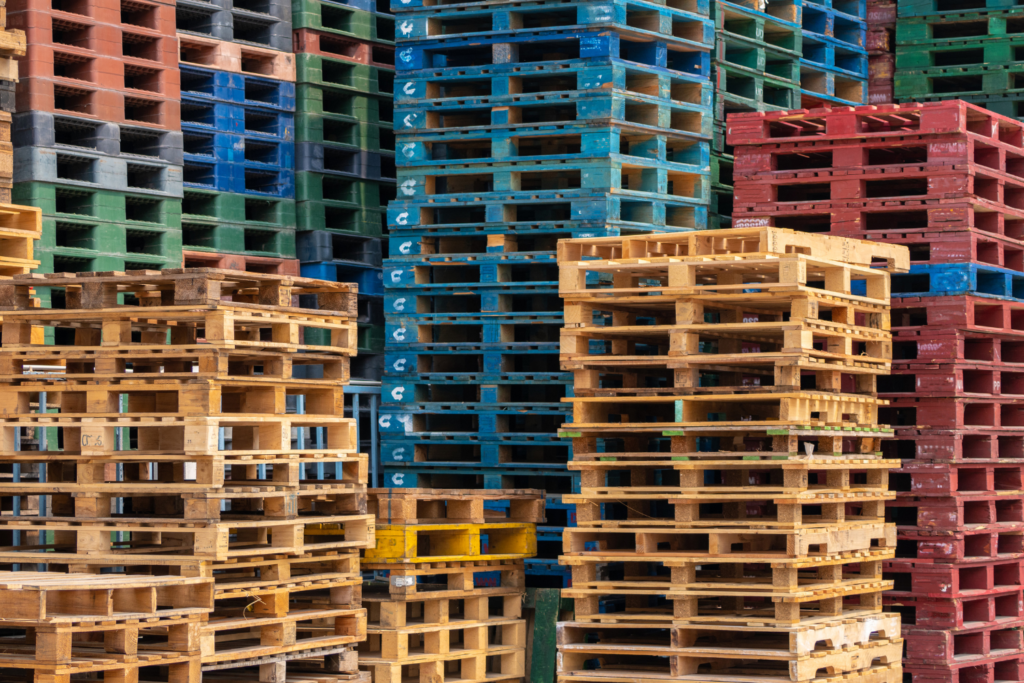
When Is It Best to Use Plastic Pallets?
Plastic pallets are best suited for applications that prioritize durability, hygiene, low maintenance, and compliance with regulations.
Below are some situations where plastic pallets may be the best choice.
1. You Want Your Pallets to Last for Over Five Years
If you want your pallets to last for over five years, plastic pallets are ideal due to their durability and resistance to wear and tear.
Unlike wooden pallets, which can splinter or become weakened by moisture or pests, they maintain their structural integrity over time, making them a cost-effective choice in the long run.
This durability minimizes the need for frequent replacements.
2. You Work in an Industry with Strict Hygiene Requirements
For industries with strict hygiene requirements, such as food and beverage, pharmaceuticals, and healthcare, plastic pallets are the preferred option.
Their non-porous surfaces prevent the absorption of liquids and contaminants, so they are easier to clean and sanitize.
They also do not harbor pests or bacteria, ensuring compliance with health and safety regulations.
3. You Want Low-Maintenance Pallets
Unlike wooden pallets that may require regular inspections for damage, repairs, or treatment against pests and moisture, plastic pallets require minimal upkeep.
A simple wash can often suffice to keep them in good condition, saving you time and resources.
4. You Are Required to Use Plastic Pallets
In some cases, you may be required to use plastic pallets due to regulatory mandates, especially in industries like pharmaceuticals and food distribution.
These regulations are often designed to ensure product safety and integrity during transportation.
5. You Have a High Budget
Plastic pallets typically have a higher upfront cost, but their longevity, lower maintenance, and recyclability can lead to significant savings over time.
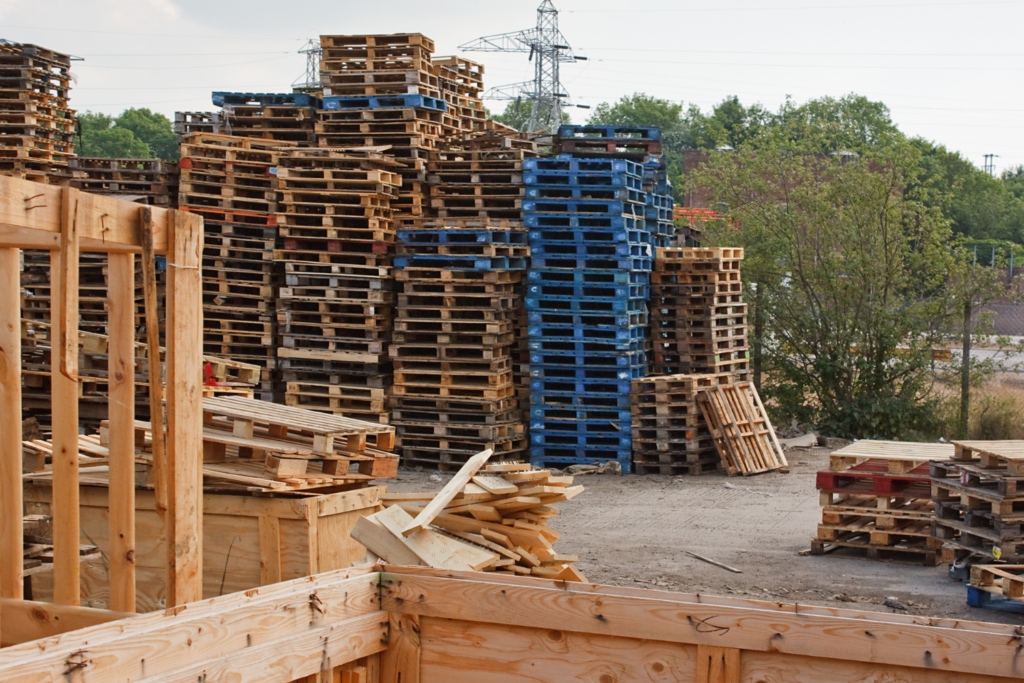
When Is It Best to Use Wooden Pallets?
When is it best to use wooden pallets? They are best suited for short-term use, high-volume supply, regulatory compliance, and budget constraints.
Below are the explanations.
1. You Will Use Pallets for a Short Period
Wooden pallets’ lower initial cost makes them suitable for temporary projects, events, or short-term shipments where durability is less of a concern.
Since wooden pallets can be easily disposed of or recycled after use, they offer a cost-effective solution for situations where long-term investment isn’t necessary.
2. You Need a Consistent Monthly Supply of 100+ Pallets
If you need a consistent monthly supply of 100 or more pallets, wooden pallets can be a reliable choice.
The widespread availability and standardization of wooden pallet sizes allow you to quickly source what you need, ensuring smooth operations without delays.
3. You Are Required to Use Wooden Pallets
You may be required to use wooden pallets to comply with specific regulations or industry standards.
This requirement can stem from logistics needs, environmental considerations, or company policies.
Using wooden pallets in such scenarios ensures compliance while also leveraging their advantages, such as being compatible with existing systems and processes that may already utilize them.
4. Your Budget Is Limited
If your budget is limited, wooden pallets are generally the most economical option available. They are typically less expensive to purchase than plastic pallets.
Their cost-effectiveness extends to sourcing and transportation as well.
While they may require more maintenance and repairs over time, the initial lower investment can be crucial if you are looking to minimize expenses.

Conclusion
Both plastic and wooden pallets present unique advantages and considerations that cater to specific operational needs and environmental goals.
You should assess factors like duration of use, hygiene requirements, maintenance capabilities, and regulatory compliance when deciding which type of pallet to adopt.
If you need help with that, we can provide advice and assistance. Contact us or email us at info@chesapeakepallets.com.
Check out this page if you want to learn more about our pallet products.
Chesapeake Pallets has been helping companies across the United States level up their logistics, one pallet at a time.
For inquiries, email info@chesapeakepallets.com or request a quote below!

